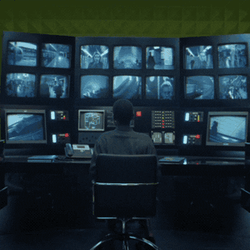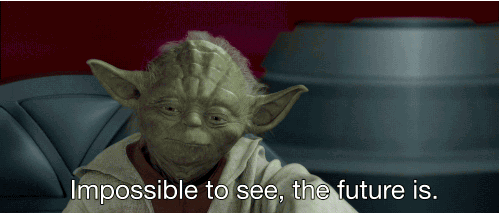4 Signs You Aren’t As Data-Driven As You Think: Part 3- Decisions Have Too Much 'Gut'
Human experiences shape who we are.
We all have things we’ve gone through and seen that influence how we process events and make decisions.
We know the value of these varied and unique perspectives, in business and in life in general.
-1.gif?width=444&height=250&name=giphy%20(29)-1.gif)
Many business decisions should not be just decided based on human experience alone.
An anecdote from one exec’s experience from years ago shouldn’t be a deciding factor in going with route A versus route B.
Major decisions with huge impact are often based on data and rigorous analysis, however, many times small decisions which may seem inconsequential at the first glance we rely too heavily on human gut.
And those small decisions add up.

The reality is that this happens far too often.
And could this be costing thousands (or millions) of dollars?
How would we know otherwise?
Humans Can Only Handle So Much Info- what does that mean for Business Health?
One big driver in us creating the infographic was reading that humans can only handle four sources of information at once.
And that’s something we know gets overlooked far too often in todays overstimulated, overbooked world.
A lot of us think we’re being productive when we have a Teams meeting going on in the background, dashing off an email to a vendor, and texting back our parents in the span of thirty minutes.

Not actually.
By trying to stretch ourselves across more stimuli in very surface level ways, we lose out on more productive, higher quality work.
Multitasking is bad enough for us as individuals. Those few sources of information we can use get taken up quickly.
So how much worse is it on business?
If a human decision-maker can only handle four stimuli at once, how can humans be expected to make correct decisions for entire businesses?
Businesses capture so many inputs every day, even every hour from that huge tech stack we talked about in Part 1.
So, how could one persons anecdote or experience be the right decision? How could they account for the amount of data points we have? And even if it is the right call, how can it be proven without further data examination?
It just can’t be.

There’s absolutely value in human experiences and varied perspectives in business.
But using the data we already collect is a better way to go about decision-making. More on that later 😉
Cognitive Biases Kill Data-Driven Decision-Making... And Profitability
Another issue beyond the one “multitasker” behind a big decision-maker is those pesky cognitive biases.
Those can come from anyone at any level of the business.
It can influence day-to-day decisions made by more junior employees, or those larger, business-wide affecting decisions made in the c-suite.
“Well, my account didn’t respond despite my three follow-ups after our QBR. I won’t do that anymore. It was a waste of both of our time.”
Ever heard something like this?

That’s a classic case of sample size neglect bias.
They based their decision on only one instance of an account not being receptive to their follow-ups.
In reality, this could have happened for a multitude of reasons, and isn’t applicable to every account going forward.
Or maybe you’ve heard a conversation like this-
“My new account is just not liking the new longer onboarding process. I’m gonna go back to the old way that we we’re doing.”
“Well, then I’m going to do the same for my next account. I hated the idea of doing a longer onboarding anyways.”
Now that’s confirmation bias.
The second employee can’t just decide to go off on their own way.

They went into the new onboarding process with a bad taste in their mouth, and are using the first employee's experience to confirm their suspicion that the longer onboarding isn’t worth it anyways.
Yikes!
So no matter what cognitive bias is occurring, they just aren’t good.
Our brains are powerful things, but things like cognitive biases can really hold us back from making neutral decisions that are best for business and for profitability.
Carefully determining how best when and where to use human decision-making versus when to leverage the data we already have is key to long-term business health.
Even when we make the right decision in the moment, things can change on a dime.
The customer when the relationship first started could totally pivot their product. Teams can change. Budgets can grow... or shrink.
Think about how much has changed in just the past decade- did you regularly use team management software? Was everything at your doctor's office on physical paper?

If we want to keep customers, we’ve got to move with them!
Adaptability is key- and there’s a way for us to be more flexible for our customers. Something much better than our own gut decision-making...🤸
Data is key to better business decision making
Human decision-making is a superpower in some regards.
Leaning into our instincts can help us be better managers and more empathetic coworkers.
But when we need to make decisions that impact our bottom line, rooting those in data is the best way to go about it.
And machines can do a lot of that heavy work for us. They can aggregate thousands of data points and make sense of them- much better than our limit of four at a time!

The great thing about integrating machines and computing into your decision-making is it also takes some of the stress of you.
There’s less guesswork on whether or not it was the right call- you can look at the data in front of you and then be able to track why that decision was right for the results you want to achieve.
So when we bring artificial intelligence into the picture, and afterwards combine it with that human touch, we can truly make better decisions!
Making Business Data Easier to Use and Understand by adding Artificial Intelligence: Meet Tingono
So cognitive biases and betting too much on ourselves can really hamper positive business results.
We can try as we might to make the best decisions- but human trying only goes so far.
When we start using data alongside our own ideas, it helps us make big (and maybe small) decisions better.

And even if a decision ends up not working (we still can’t predict everything!), we can still use the data to understand the problem better for when we encounter it again.
I really liked this thought from Paul Brook:
The best thing about our new AI machine allies is that they can learn with us.
I think that really holds true. And especially with what we’re working on here at Tingono.

As we build a product that has the power to change how we retain customers, it’s only going to get better the more data and information we have.
The constant learning that occurs with artificial intelligence-powered applications like ours can help all of us make these better, data-driven decisions.
Want to see it in action? Book a demo today!
Read The Rest of The Series:
Part 1: Data Siloes
Part 2: Messy Data






